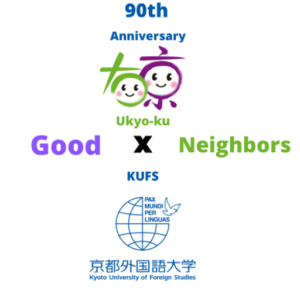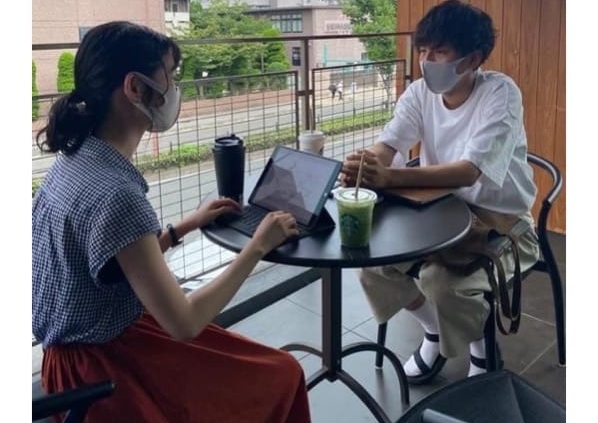[Living Histories] Mr. Takatoshi Tsutsui
Interviewers/Authors: Ai Umeda, Chihiro Okajima
Takatoshi Tsutsui is from Ukyo Ward and is currently a fourth-year student at Ritsumeikan University’s College of Social Sciences. Ritsumeikan University has students from many other prefectures in Japan, which allows local students there to have a number of new encounters with people from outside the Kyoto area. He is currently studying sociology, with a main focus on the declining birthrate in Japan and parent-child relationships, in his graduation seminar. He is also engaged in a variety of different activities outside the university.
― We read in an article of an interview you gave to the Ukyo Fan Club Network that you have experienced working at a lot of different part-time jobs. Which of these do you think impacted on you the most?
Mr. Tsutsui: At the French restaurant where I worked for about two years, I improved my ability to communicate with people I met for the first time. When I first started working there, I was not good at making conversation with customers, so I tried to avoid this by working behind the scenes (such as washing dishes) instead of serving customers. However, the chef encouraged me to start talking more with the clientele, and soon I found it more fun to do. After that, I started to communicate more using my own initiative. In addition to the ability to communicate, I began to acquire the ability to observe people at the same time, and thereafter was able to provide services and conversation that best met the customer needs.
― We have also heard that you have been active as a shonenhodo-in1 (community youth police volunteer) in the Ukyo Ward area. What made you want to become a shonenhodo-in?
Mr. Tsutsui: My mother was a shonenhodo-in, and I started it when she invited me.
― What do you have to do as a shonenhodo-in?
Mr. Tsutsui: I help with learning support at local schools, as well as some extracurricular activities. Unfortunately, all our activities are currently suspended due to the Covid-19 pandemic.
―What did you pay most attention to when you were working as a shonenhodo-in?
Mr. Tsutsui: I was very careful not to lose focus just because they were children, as kids often take notice of the behavior and words of adults. While it is important to explain things logically to children, it is also important to show them through actions because there are many things that cannot be understood by words alone. For example, for handwashing, I demonstrate by washing my own hands first, and then encourage them to do the same. In addition, the way to explain differs depending on the age of the child, so the way of communicating also differs between children in the lower grades and those in the upper grades. In order for children to communicate well with each other, I would ask the children in the upper grades to teach those in the lower grades. Giving them a role with responsibility usually makes them happy, because they believe they are being asked to be reliable, and they will want to do a good job. However, such guidance needs to be consistent. If there is a difference in the content of instruction, children don’t know who to believe. Therefore, it is necessary for the adults involved to agree with each other on the approach first. On occasions, I might have a disagreement with my mother, who is also a shonenhodo-in, but we usually try to thoroughly discuss it and come to an understanding.
― Besides the shonenhodo-in work, we believe you are engaged in another community activity. Could you tell us more about this, please?
Mr. Tsutsui: At present, I’m helping the younger students at my university find jobs through connecting with EN-COURAGE, a career support NPO. Generally, they tend to focus on simply getting a job. However, I believe getting a job does not have to be merely a stepping stone in life, but can also be a greater connection between the present and the future. I try to support them in developing this attitude by clarifying their own purpose in life.
― Can you please tell us what you like best about Ukyo Ward?
Mr. Tsutsui: Ukyo Ward is a nice mix of nature, countryside and city, where you can see different facets of life in the towns, but also hidden attractions. Among these is Keihoku Town, which has very rich nature and is my favorite place.
― Which historical or famous places in Ukyo do you think people would find particularly interesting or special?
Mr. Tsutsui: Arashiyama is in Ukyo Ward, right? How about Togetsukyo Bridge? It is a great place if you are a movie lover as it is often used as a location in movies, and many tourists visit there.
― Is there anything about Ukyo Ward you would like to see change or improved upon?
Mr. Tsutsui: Ukyo Ward is a very convenient place to live, but one of the things I think could be improved is some aspects of personal safety concerning elementary school students. In addition, traffic congestion caused by the increase in tourists should be addressed. In particular, city buses, which are also used by tourists, are a means of transportation for locals as well, and the effects of bus delays cannot be ignored. For example, even if the bus was late on my way to school and I was late for class, it was not treated as a public transportation delay. In order to reduce this, I think it might be necessary to disperse the concentration of tourists and create a flow of tourists to other areas of Ukyo Ward. However, currently of course, the number of tourists has decreased dramatically due to the spread of the Covid19 virus.
― Do you know anything about Kyoto University of Foreign Studies and Gaidai Nishi High School?
Mr. Tsutsui: My relationship with Kyoto University of Foreign Studies and Gaidai Nishi High School dates back to my elementary school days. I often participated in sporting events for elementary school students held by the students of Kyoto University of Foreign Studies at that time. I had the impression that they were very active in building relationships and other community activities. At Gaidai Nishi High School, the baseball club was strong, and I often saw the members of the baseball club running out in the streets.
― Is there anything more you want to know about Kyoto University of Foreign Studies and Gaidai Nishi High School?
Mr. Tsutsui: Before entering Ritsumeikan University, I often heard their names in Ukyo Ward, but after entering university, I didn’t often hear about them that often anymore. I was surprised by the gap because I had the impression that Kyoto University of Foreign Studies was pretty active in contributing to the local community. Actually, I want many people to know more about this university because I have been familiar with it most of my life.
Note
- Shonenhodo-in (community youth police volunteer): A person commissioned by the Chief of Police to engage in various delinquency prevention activities in the community.



